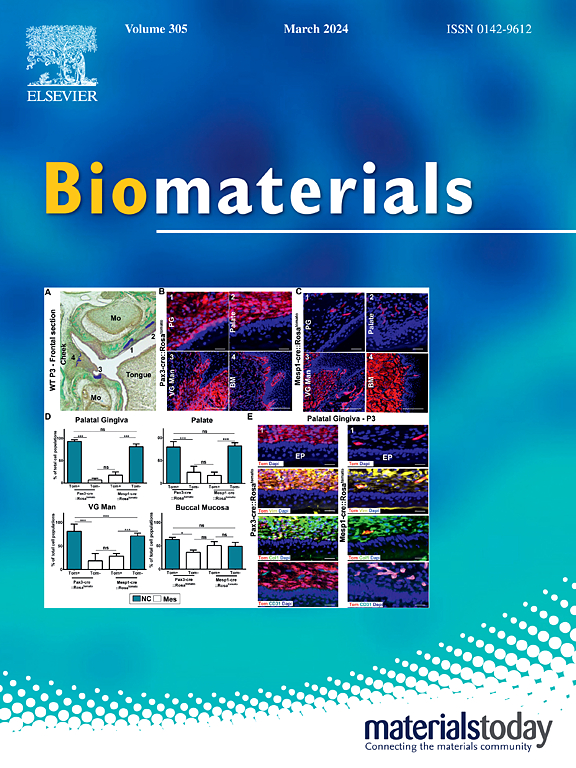设计益生菌生物氢微型工厂,启动还原应激,提高肿瘤易感性。
IF 12.8
1区 医学
Q1 ENGINEERING, BIOMEDICAL
引用次数: 0
摘要
氧化还原平衡的破坏会严重影响细胞的新陈代谢和活动。虽然氧化应激在癌症治疗中被广泛研究,但还原应激的研究仍处于起步阶段。分子氢(H2)是一种众所周知的抗氧化剂,由于其强大的抗氧化特性,它在诱导还原应激方面具有很大的潜力,因此是一种很有希望的癌症治疗候选物质。然而,开发一种可持续的体内氢气输送系统仍是一项重大挑战。在这里,我们设计了一种基于凝胶的微胶囊,它能封装产气肠杆菌(又称益生菌生物氢微胶囊(PBMCs)),从而在肿瘤微环境中持续产生H2。值得注意的是,PBMCs 能有效抑制八种肿瘤细胞系以及耐药癌细胞的增殖。4T1 细胞中的 GSH/GSSG 比值显著增加,证明了 PBMCs 长期释放 H2 引发了还原应激。此外,PBMCs 还在乳腺癌、黑色素瘤和肝癌模型中显示出显著的抗肿瘤作用。抑制 PI3K-AKT 通路和激活 MAPK 通路是诱导肿瘤细胞周期停止和凋亡的关键机制。PBMCs 与化疗药物联合使用还能产生协同效应,从而有力地抑制浸润前癌细胞的生长和常见的肺转移。总之,我们的研究提出了一种创新策略,通过原位生成 H2 来操纵肿瘤微环境中的还原应激,从而增强肿瘤的脆弱性。本文章由计算机程序翻译,如有差异,请以英文原文为准。
Engineering probiotic biohydrogen micro-factories to initiate reductive stress for boosting tumor vulnerability
Disruption of redox homeostasis profoundly affects cellular metabolism and activities. While oxidative stress is extensively studied in cancer therapies, research on reductive stress remains in its infancy. Molecular hydrogen (H2), a well-known antioxidant, holds significant potential to induce reductive stress due to its strong antioxidative properties, making it a promising candidate for cancer therapy. However, it remains a major challenge to develop a sustainable H2 delivery system in vivo. Herein, we designed a micro-factory by engineering a gel-based microcapsule that encapsulates Enterobacter aerogenes, a.k.a. probiotic biohydrogen microcapsules (PBMCs), enabling the sustained H2 generation within tumor microenvironment. Notably, PBMCs effectively suppressed the proliferation of eight tumor cell lines as well as drug-resistant cancer cells. The prolonged H2 release from PBMCs induced reductive stress, as evidenced by a significant increase in the GSH/GSSG ratio in 4T1 cells. Moreover, PBMCs displayed significant antitumor effects in breast, melanoma and liver cancer models. The inhibition of PI3K-AKT pathway and the activation of MAPK pathway were identified as key mechanisms responsible for inducing tumor cell cycle arrest and apoptosis. The PBMCs also exhibited synergistic effects in combination with chemotherapeutics, resulting in robust inhibitions of preinvasive carcinoma growth and commonly associated pulmonary metastasis. Overall, our study introduces an innovative strategy to manipulate reductive stress in the tumor microenvironment through in situ H2 generation, thereby enhancing tumor vulnerability.
求助全文
通过发布文献求助,成功后即可免费获取论文全文。
去求助
来源期刊

Biomaterials
工程技术-材料科学:生物材料
CiteScore
26.00
自引率
2.90%
发文量
565
审稿时长
46 days
期刊介绍:
Biomaterials is an international journal covering the science and clinical application of biomaterials. A biomaterial is now defined as a substance that has been engineered to take a form which, alone or as part of a complex system, is used to direct, by control of interactions with components of living systems, the course of any therapeutic or diagnostic procedure. It is the aim of the journal to provide a peer-reviewed forum for the publication of original papers and authoritative review and opinion papers dealing with the most important issues facing the use of biomaterials in clinical practice. The scope of the journal covers the wide range of physical, biological and chemical sciences that underpin the design of biomaterials and the clinical disciplines in which they are used. These sciences include polymer synthesis and characterization, drug and gene vector design, the biology of the host response, immunology and toxicology and self assembly at the nanoscale. Clinical applications include the therapies of medical technology and regenerative medicine in all clinical disciplines, and diagnostic systems that reply on innovative contrast and sensing agents. The journal is relevant to areas such as cancer diagnosis and therapy, implantable devices, drug delivery systems, gene vectors, bionanotechnology and tissue engineering.
 求助内容:
求助内容: 应助结果提醒方式:
应助结果提醒方式:


